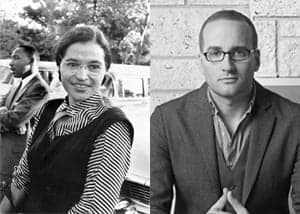BY LISA KEEN
Now that the great public gnashing of teeth has subsided over New York Times reporter Jo Becker's history of the Proposition 8 litigation, Forcing the Spring, there's an opportunity to chew on some of the book's useful disclosures.
 For all the consternation it has caused, Becker's trespass in portraying American Foundation for Equal Rights founder Chad Griffin as the Rosa Parks in the fight for marriage equality is not much worse than all the many times newspapers, magazines, and even knowledgeable people in the LGBT community have casually pronounced Stonewall as the start of the gay civil rights movement and rioting drag queens as the pioneers. The movement started decades earlier, and its pioneers were people who pushed back against discrimination in many different ways.
For all the consternation it has caused, Becker's trespass in portraying American Foundation for Equal Rights founder Chad Griffin as the Rosa Parks in the fight for marriage equality is not much worse than all the many times newspapers, magazines, and even knowledgeable people in the LGBT community have casually pronounced Stonewall as the start of the gay civil rights movement and rioting drag queens as the pioneers. The movement started decades earlier, and its pioneers were people who pushed back against discrimination in many different ways.
It also appears that Becker's idea for dubbing Griffin, now president of the Human Rights Campaign, as a Rosa Parks type hero came from a National Archives development official. On page 381 of Forcing the Spring, Becker recounts how Jesika Jennings was showing Griffin and the plaintiffs around the Archives' “Courting Freedom” exhibit. According to the Archives website, the exhibit “explores the evolution of American civil liberties with highlights from the evidence and judgments in important court cases, including documentation from the police report on the arrest of Rosa Parks.” While showing the group through that room, wrote Becker, Jennings told the plaintiffs that she was honored to show them around and that their own records “will be here in twenty to twenty-five years.”
“It's like having the opportunity to give Rosa Parks a tour of the Declaration and the Constitution,” Jennings said, according to Becker. And Jennings, who now works elsewhere, confirmed the Rosa Parks quote as “quite accurate.”
 It's also worth noting that much-respected gay legal activist Paul Smith (right) called the Proposition 8 litigation “hugely significant,” according to a quote on page 387. Smith is the attorney who successfully argued the U.S. Supreme Court to strike down sodomy laws in the landmark Lawrence v. Texas case. He was also, according to what Olson told Becker, the first co-counsel Olson sought to work with on the Prop 8 case, but Smith turned him down. According to Becker's account, which she said she got from an interview with Smith, Smith had “entertained the idea of bringing a federal challenge to same-sex marriage bans” in the wake of his 2003 victory in Lawrence. He had just joined the board of Lambda Legal when Olson approached him about filing such a challenge in 2009. But Smith declined, telling Olson that he decided against filing a challenge to the marriage bans “after talking to a number of former Supreme Court clerks.” The clerks had convinced Smith that it would not be easy to win Justice Anthony Kennedy's vote to strike down state laws banning marriage for same-sex couples.
It's also worth noting that much-respected gay legal activist Paul Smith (right) called the Proposition 8 litigation “hugely significant,” according to a quote on page 387. Smith is the attorney who successfully argued the U.S. Supreme Court to strike down sodomy laws in the landmark Lawrence v. Texas case. He was also, according to what Olson told Becker, the first co-counsel Olson sought to work with on the Prop 8 case, but Smith turned him down. According to Becker's account, which she said she got from an interview with Smith, Smith had “entertained the idea of bringing a federal challenge to same-sex marriage bans” in the wake of his 2003 victory in Lawrence. He had just joined the board of Lambda Legal when Olson approached him about filing such a challenge in 2009. But Smith declined, telling Olson that he decided against filing a challenge to the marriage bans “after talking to a number of former Supreme Court clerks.” The clerks had convinced Smith that it would not be easy to win Justice Anthony Kennedy's vote to strike down state laws banning marriage for same-sex couples.
 Becker said Olson “considered” asking another respected openly gay attorney for his co-counsel: Kathleen Sullivan. Sullivan had been co-counsel on one of LGBT legal history's biggest losses: Bowers v. Hardwick. That 1986 decision at the Supreme Court, upholding the right of states to prohibit private sexual relations between people of the same sex, was used to the detriment of gays for years, by courts far and wide on a range of issues –from employment, military, adoption, and custody of one's own biological child. It essentially labeled all gays as law-breakers and, in some states, as felons. And the hostility and disregard for gay people in the language of the Hardwick decision affected public discourse for years to come.
Becker said Olson “considered” asking another respected openly gay attorney for his co-counsel: Kathleen Sullivan. Sullivan had been co-counsel on one of LGBT legal history's biggest losses: Bowers v. Hardwick. That 1986 decision at the Supreme Court, upholding the right of states to prohibit private sexual relations between people of the same sex, was used to the detriment of gays for years, by courts far and wide on a range of issues –from employment, military, adoption, and custody of one's own biological child. It essentially labeled all gays as law-breakers and, in some states, as felons. And the hostility and disregard for gay people in the language of the Hardwick decision affected public discourse for years to come.
Olson never asked Sullivan, concluding that, because her name was mentioned in the press as a potential nominee for President Obama to name to the Supreme Court, it wasn't a good idea.
“If she joined the [Olson] team and then was nominated and confirmed,” wrote Becker of Olson's thinking, “she would have to recuse herself in the event the case reached the Supreme Court, which would make the odds of winning much steeper.” (Left unsaid was what working on the Prop 8 legal team might have done to Sullivan's chances of being nominated.)
Becker also famously paints a dramatic scene in which two well-respected legal activists from Lambda Legal and two of their allies from the ACLU storm out of a meeting early on with Griffin, several of his associates, and attorney Ted Boutrous from the Olson team. Becker wasn't at that meeting, which took place on May 14, 2009. It was a meeting at which Griffin and his team were reportedly trying to seek support for their lawsuit from the LGBT legal establishment groups.
This was eight days before Olson's team filed the lawsuit and arguably not the best time to make a sincere solicitation of input from lawyers who have been in the trenches representing the LGBT community's legal rights for decades. It may have felt a little like, “Rosa Parks, we're taking over this bus and driving all the way to the Supreme Court!” LGBT legal activists knew they were heading to the Supreme Court over marriage equality eventually, but they had been working meticulously on building the correct vehicle for the journey to maximize their chances for victory and avoid another Hardwick setback.
According to Becker's account of the meeting where the AFER-Olson lawsuit was unveiled to LGBT legal groups, Hollywood producer Rob Reiner, who hosted the meeting at his home and was helping raise the money to fund the litigation, gave the four invited attorneys a synopsis of the plan, and Olson colleague Boutrous noted, “Someone is going to bring a federal marriage lawsuit and you won't find a better advocate than Ted Olson.”
Next week: The big blow-up revisited: When Hollywood met the LGBT movement's hired guns.
© 2014 Keen News Service. All rights reserved.



